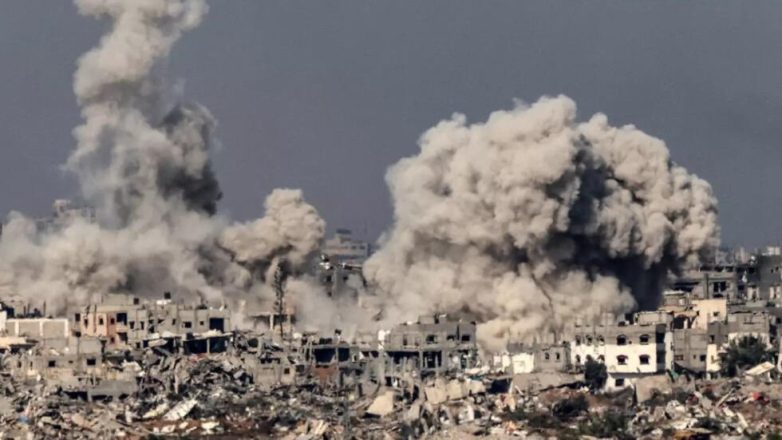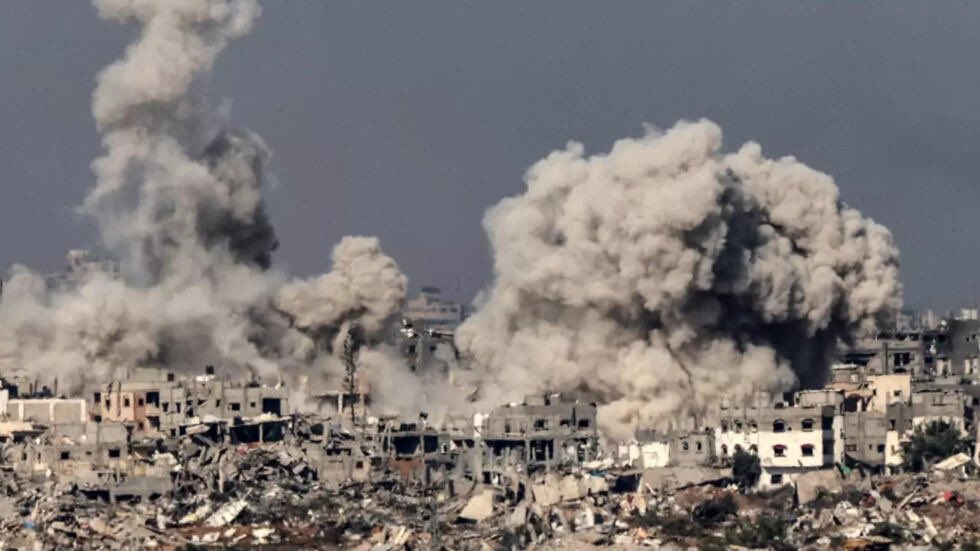
Hypocrisy Exposed: Who’s Really to Blame for Iran’s Nuclear Ambitions?
nuclear proliferation consequences, geopolitical tensions Middle East, foreign policy hypocrisy
The Debate Surrounding Iran’s Nuclear Capabilities
In recent years, the discourse surrounding Iran’s nuclear program has intensified, particularly with regard to the legitimacy and implications of the nation acquiring nuclear weapons. As highlighted in a tweet by Yousef D. Hammash, the conversation often involves contrasting perspectives from various countries, especially those that have historically engaged in military conflicts. This article aims to summarize the key points surrounding Iran’s nuclear ambitions, the historical context of nuclear proliferation, and the double standards that critics of Iran often exhibit.
Understanding Iran’s Nuclear Program
Iran’s nuclear program has been a focal point of international relations for over two decades. Initially established for peaceful purposes, the program has raised concerns among countries like the United States and Israel, who fear that Iran might develop nuclear weapons capabilities. The primary argument against Iran possessing nuclear weapons is grounded in the potential threat it poses to regional stability and global security.
The Joint Comprehensive Plan of Action (JCPOA), an agreement reached in 2015 between Iran and six world powers, aimed to limit Iran’s nuclear activities in exchange for the lifting of economic sanctions. However, the United States’ withdrawal from the agreement in 2018 led to heightened tensions and a resurgence of debates about Iran’s intentions and capabilities.
The Historical Context of Nuclear Proliferation
To understand the controversy surrounding Iran’s nuclear program, it is essential to examine the historical context of nuclear proliferation. Many of the countries that criticize Iran for seeking nuclear capabilities have themselves developed nuclear arsenals. For instance, the United States, Russia, China, France, and the United Kingdom are all recognized nuclear powers, while countries like India, Pakistan, and North Korea have also pursued nuclear weapons.
Critics argue that nations with established nuclear capabilities should not dictate the terms of nuclear proliferation to others. This double standard raises questions about the fairness of international nuclear agreements and the motivations behind them. The tweet by Hammash underscores this irony, suggesting that the same nations opposing Iran’s nuclear aspirations have histories of engaging in military actions that have had devastating consequences.
The Double Standards in Global Nuclear Politics
The concept of double standards in global politics is particularly relevant when discussing nuclear weapons. Critics of Iran often point to the nation’s alleged support for terrorism and its contentious relationship with Israel as justifications for their opposition to Iranian nuclear development. However, this stance can be perceived as hypocritical when considering the military actions undertaken by the same critics, which have resulted in significant civilian casualties and destabilization in various regions.
For instance, the United States’ military interventions in Iraq and Afghanistan, as well as its support for Israel during conflicts in Lebanon and Gaza, have led to widespread destruction and loss of life. Opponents of Iran’s nuclear program often overlook these historical events, focusing solely on Iran’s potential threat while ignoring the consequences of their own military actions.
The Geopolitical Implications of Iran’s Nuclear Program
The geopolitical implications of Iran acquiring nuclear weapons extend beyond the immediate region. If Iran were to develop a nuclear arsenal, it could trigger an arms race in the Middle East, prompting other nations to pursue their own nuclear capabilities. Countries like Saudi Arabia and Turkey have already expressed concerns about Iran’s ambitions and may feel compelled to respond by seeking their own nuclear deterrents.
Moreover, the proliferation of nuclear weapons in the Middle East could undermine global non-proliferation efforts, complicating diplomatic relationships and increasing the likelihood of conflict. The potential for a nuclear-armed Iran raises critical questions about how the international community can address these challenges effectively and equitably.
The Importance of Dialogue and Diplomacy
In light of the complexities surrounding Iran’s nuclear program, it is crucial to emphasize the importance of dialogue and diplomacy. Engaging in constructive conversations can help alleviate tensions and foster mutual understanding among nations. The JCPOA was a step in the right direction, demonstrating that diplomacy could yield positive results when addressing contentious issues.
Rebuilding trust between Iran and the international community requires a commitment to transparency, accountability, and adherence to international norms. It is essential for all parties to engage in good faith negotiations, avoiding the pitfalls of double standards and historical grievances.
Conclusion: A Call for Fairness in Nuclear Discourse
The debate over Iran’s nuclear program is emblematic of broader issues related to nuclear proliferation, international relations, and geopolitical dynamics. As highlighted by Yousef D. Hammash’s tweet, the hypocrisy surrounding calls for Iran to refrain from pursuing nuclear weapons is evident when one considers the actions of those making such demands.
To foster a more equitable global landscape, it is imperative to address the issue of nuclear proliferation without bias or double standards. By promoting dialogue, understanding, and a commitment to shared security, nations can work together to navigate the complexities of nuclear politics and ensure a safer future for all. The conversation surrounding Iran’s nuclear ambitions is not merely about one country’s capabilities; it is a reflection of the broader challenges facing the international community in its quest for peace and stability.

The same people saying Iran can’t have nukes are the ones who did this. pic.twitter.com/ErafS0dyhZ
— Yousef D. Hammash (@YousefHammash) June 23, 2025
The Same People Saying Iran Can’t Have Nukes Are the Ones Who Did This
It’s no secret that discussions around nuclear weapons can ignite heated debates. The statement, “The same people saying Iran can’t have nukes are the ones who did this,” captures a sentiment that resonates with many who follow international relations. This quote, shared by Yousef D. Hammash, highlights a perspective that questions the hypocrisy often found in global politics. In this article, we’ll explore the implications of nuclear policies, the historical context surrounding Iran’s nuclear ambitions, and the broader conversation about power dynamics in international relations.
Understanding the Context: Iran’s Nuclear Ambitions
Iran’s pursuit of nuclear technology has been a contentious issue for decades. The country insists that its nuclear program is for peaceful purposes, primarily energy generation. However, many nations, particularly in the West, fear that Iran’s ultimate goal is to develop nuclear weapons. This fear has led to a series of sanctions and diplomatic efforts aimed at curbing Iran’s nuclear ambitions.
But what lies behind these fears? Let’s take a look at some historical events that frame the current narrative. The 1979 Islamic Revolution in Iran led to a significant shift in the country’s relationship with the West. Following this, the Iran-Iraq War (1980-1988) fueled Iran’s desire for a robust defense system, including nuclear capabilities. The shadow of the Cold War and the proliferation of nuclear weapons among nations only intensified these concerns.
The Double Standards of Nuclear Proliferation
One of the most frustrating aspects of the nuclear debate is the apparent double standards in how different countries are treated. Nations like the United States and its allies often argue against nuclear proliferation but have historically engaged in nuclear development themselves. For example, the U.S. dropped atomic bombs on Hiroshima and Nagasaki during World War II, an action that remains controversial to this day.
Moreover, there are several countries with nuclear arsenals that have faced little to no international backlash, while others, like Iran, are scrutinized intensely. This inconsistency raises questions about the fairness of global nuclear policies. Many critics argue that the narrative surrounding Iran’s nuclear ambitions is less about safety and more about maintaining power dynamics in the region.
Who Are “The Same People”?
When Hammash mentions “the same people,” he is likely referring to Western powers, particularly the U.S. and its allies, who have historically been the architects of many controversial military actions and policies. These nations often position themselves as the moral compass in global politics, advocating for nuclear disarmament while simultaneously possessing vast nuclear arsenals.
Consider the invasions of Iraq and Afghanistan. The justification for these actions was often couched in terms of promoting democracy and stability. Yet, the outcomes have been far from ideal, leading many to question the intentions behind these interventions. Critics argue that the hypocrisy shown by these nations undermines their credibility when they condemn other countries for pursuing nuclear capabilities.
The Role of International Treaties
International treaties like the Nuclear Non-Proliferation Treaty (NPT) aim to prevent the spread of nuclear weapons and promote disarmament. While the NPT has been successful in some respects, it has also faced criticism for perpetuating the status quo. The treaty allows nuclear-armed states to maintain their arsenals while pressuring non-nuclear states to refrain from developing their own.
This selective approach can be seen as a form of imperialism, where powerful nations dictate terms to weaker ones. Countries like Iran feel cornered by these restrictions, leading them to pursue nuclear technology as a means of ensuring their sovereignty and security. The irony is palpable: as some nations preach the importance of non-proliferation, they simultaneously engage in actions that undermine the very principles they espouse.
Public Perception and Media Influence
The media plays a crucial role in shaping public perception around nuclear issues. The portrayal of Iran in Western media often emphasizes the threat of its nuclear program while downplaying the historical context that has led to its pursuit of such technology. This one-dimensional narrative can contribute to a climate of fear and misunderstanding.
Social media, like the platform Hammash used to share his thoughts, has allowed for more nuanced discussions that challenge mainstream narratives. As more voices join the conversation, it becomes increasingly difficult to ignore the complexities surrounding nuclear proliferation and international relations.
The Future of Iran’s Nuclear Program
Looking ahead, the future of Iran’s nuclear program remains uncertain. The Joint Comprehensive Plan of Action (JCPOA), agreed upon in 2015, was a significant step towards curbing Iran’s nuclear ambitions in exchange for relief from sanctions. However, the U.S. withdrawal from the agreement in 2018 and the subsequent reinstatement of harsh sanctions have complicated efforts to achieve a lasting resolution.
Iran’s reaction to these developments has included ramping up its nuclear activities, further complicating diplomatic efforts. The cycle of action and reaction raises the stakes for all parties involved and underscores the need for a more equitable approach to international nuclear policy. The dialogue must shift from confrontation to cooperation, focusing on mutual security rather than unilateral demands.
Engaging in Meaningful Dialogue
For real progress to be made, it’s essential to engage in meaningful dialogue that considers the historical context and motivations of all parties involved. This means recognizing the fears and aspirations of nations like Iran while holding accountable those who have historically wielded nuclear weapons.
Public discussions, academic research, and diplomatic negotiations must prioritize understanding over condemnation. The world is interconnected, and the repercussions of nuclear policies extend far beyond national borders. By fostering a spirit of cooperation and mutual respect, we can work towards a more secure future free from the threat of nuclear conflict.
Conclusion: The Importance of Accountability
As we navigate the complex landscape of nuclear politics, it’s vital to hold those in power accountable for their actions. The phrase from Hammash serves as a powerful reminder of the hypocrisy that often defines international relations. It challenges us to question the narratives we’re presented with and to seek out the broader context behind them.
In a world where nuclear weapons continue to pose a significant threat, we must strive for transparency, fairness, and accountability in our discussions and policies. Only then can we hope to build a future that prioritizes peace and security for all nations, not just a select few.
The same people saying Iran can’t have nukes are the ones who did this.